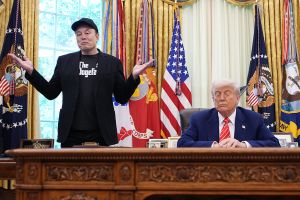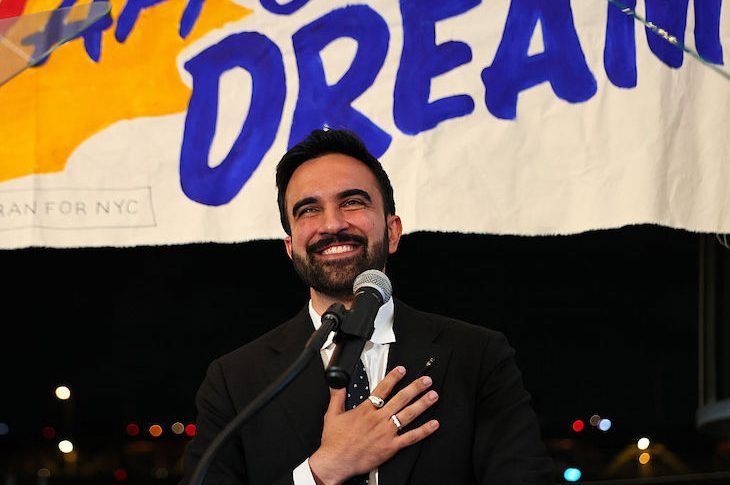Now for some bracing honesty from the Democratic National Committee. In a new, unanimously adopted resolution, Democrats have declared that ‘the religiously unaffiliated demographic represents the largest religious group within the Democratic party, growing from 19 percent in 2007 to one in three today’ (emphasis added). Advocates for truth in political advertising should rejoice. The so-called ‘secular’ left has finally abandoned the canard that its views and policies are purely ‘neutral,’ or the products of inarguable empiricism. According to the resolution, the religiously unaffiliated and the nonreligious (labels used interchangeably) are, instead, members of a new faith community. This may be the first time that the Democratic party, or any official organ of the American left, has forthrightly declared the true objective of its modern politics: the promotion and enshrinement of a new religion.
With this declaration, Democrats are taking seriously their current, favorite term, ‘wokeness’ – the religious resonance of which is unavoidable. For them, to be woke is to be awakened to new knowledge, to be freed from one’s old, ignorant ways and to share in life-changing revelation. Thus, the Democrats’ woke resolution – a concise, one-page distillation of the modern, American left worldview – reads as a confessional, creedal document. It speaks of ‘values’: ‘religiously unaffiliated Americans overwhelmingly share the Democratic party’s values.’ It speaks of ostracism and suffering for beliefs: ‘the nonreligious have often been subjected to unfair bias and exclusion in American society.’ And, it articulates the essential, core aims of the creed by praising the religiously unaffiliated as ‘advocates for rational public policy based on sound social science and universal humanistic values.’
The resolution embodies what Charles Taylor, a scholar of secularism, terms ‘the independent ethic.’ According to Taylor, in establishing an independent ethic, a group will ‘deduce certain exceptionless norms’ and ‘abstract from…deeper or higher beliefs altogether for purposes of a political morality.’ And, as Taylor explains, when there ‘are real live atheists in the society…they will live an independent ethic not as some thought experiment, but as the basis of their moral lives.’ In this way, an apparently nonreligious or even overtly anti-religious creed can assume the character of what is actually religious fundamentalism.
Like other fundamentalists, the followers of the Religion of the Unaffiliated seek to purify their ranks and drive out heretics. Their independent ethic is exclusive. Conversion requires time, effort, and complete reformation of the convert’s life and outlook. Anyone who has said or done anything inconsistent with the creed will be hard pressed to prove his or her worthiness. One need only look to the sufferings of former VP Joe Biden – a man who once, not long ago, opposed ‘universal humanistic values’ such as federally-funded abortion-on-demand – to see just how potent the new creed truly is, and how piously zealous are its defenders and doctrinal enforcers.
Of course, given that the creed’s rules are many – and that they can, at any time, change or ‘evolve’ – even earnest disciples might falter on occasion. The creed, therefore, mercifully provides for remission of sins. Believers might make offerings in the guise of carbon-footprint offsets or seek indulgence from the community by confessing their various ‘privileges.’ The creed features strict dietary laws (no foie gras, no jumbo sugary drinks) and its own, apocalyptic prophecies (the world will soon end due to climate change). All of this together – when coupled with a tough line against actual, unrepentant heretics – creates a coherent and mutually-accountable structure of faith.
Like many religions, this new Religion of the Unaffiliated also features some internal contradictions. One central, if ironic, plank of the creed is that faith-based rationales are invalid in politics. The resolution decries those who ‘have used…religious views, with misplaced claims of ‘religious liberty,’ to justify public policy that has threatened…civil rights.’ It calls, as we know, for ‘rational public policy based on sound science and universal humanistic values.’ But for those who might be ruled by its edicts, it is fair to ask: just who, or what, will be the arbiters of what is ‘rational,’ ‘sound,’ ‘scientific,’ ‘universal,’ ‘humanistic’ or, in fact, a ‘value’? It is likely that people who treat the new creed ‘as the basis of their moral lives’ will be the final judges. Arguments that do not meet their approval will be dismissed, without debate, as irrational, wrong-minded and unsound. Science that does not further their aims or agendas will be discredited, discarded or suppressed. (Consider, for instance, the example of Galileo Galilei to see how things can go when science challenges powerful, religious authorities). The new authorities, like those in bygone ages, justify their actions by appeal to their own religious framework – which, after all, they claim is universal. Thus, the Religion of the Unaffiliated, however enlightened or woke it may be, simply seeks to supplant traditional types of religiously-based decision-making with its own version of the same.
As various outlets have reported, Michael Wear, director of faith outreach for President Barack Obama, has strongly criticized the new DNC resolution. According to Wear, it ‘is both politically stupid, but also, just stupid on a fundamental level that transcends electoral politics.’ He is concerned that Democrats’ embrace of the Religion of the Unaffiliated will cost them votes in America’s traditional faith communities. Wear, however, misses the crucial words in his own statement. The resolution does, in fact, transcend politics and electoral calculations. As the announcement of a powerful, transcendent ideology, it is certainly fundamental. It is the embrace and declaration of the Godless religion of non-religion.
As we assess the state of the Democrats in 2020, we must not attempt to reduce the party’s proclamations to mere politics. Driven by the beliefs of their largest, and most rapidly growing, religious group, the Democrats have become true believers in a new, exclusive faith of their own making. Today’s Democrats live their creed, in Taylor’s terms, as the basis of their moral lives. They reject those who deny its tenets. They tearfully confess and apologize with heartfelt compunction whenever they, themselves, transgress any of its universal decrees. And they are willing, if necessary, to die – at the polls – for its cause.
Augustus Howard is a Research Associate at Emmanuel College, University of Cambridge.


























